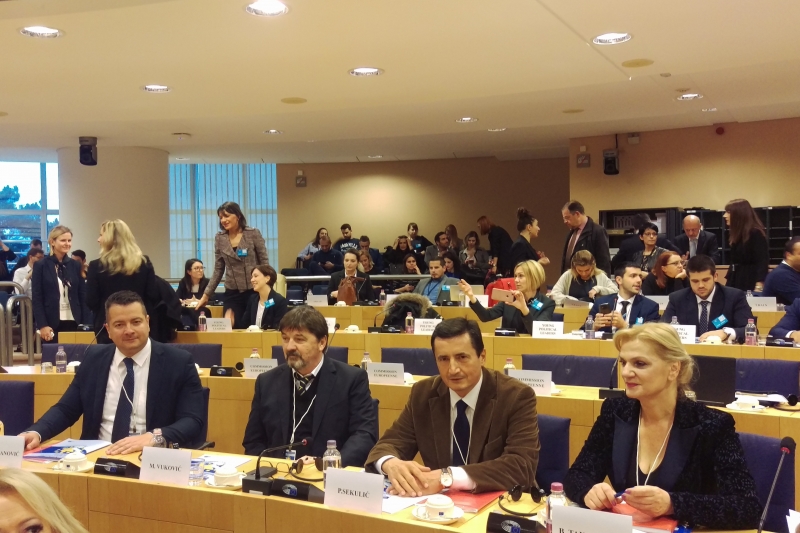The High-level Round Table on the European integration of the Western Balkans, organised by the European Parliament, has begun today in Brussels. Delegation of the Parliament of Montenegro in the following composition: Mr Adrijan Vuksanović, Mr Miodrag Vuković, Ms Branka Tanasijević, and Mr Predrag Sekulić, participates in the Round Table.
Mr Eduard Kukan, Chairperson of the Working Group on Western Balkans in the Committee on Foreign Affairs, European Parliament, gave introductory remarks at the event, where he pointed out the significance of integration of the entire Western Balkans as a clear interest of the European Union, and in that respect he commended the multilateral approach and regional perspective which were the basis for organising this event. The attendees were also addressed by Ms Heidi Hautala, Vice President of the European Parliament, who pointed out the key role of parliaments in the accession process, as the institutions which should monitor the implementation of the European regulations and of the reforms on the field.
This was followed by the debate on the implementation of the reform agenda in the Western Balkans countries, in which standing rapporteurs and shadow rapporteurs for the Committee on Foreign Affairs of the European Parliament, heads of EP delegations in joint parliamentary committees with the Western Balkans countries, and parliamentarians from the countries in the region participated.
On behalf of the Parliament of Montenegro, the participants were addressed by Chairperson of the Committee on European Integration Mr Adrijan Vuksanović and Chairperson of the Constitutional Committee Mr Miodrag Vuković. Mr Vuksanović said that, with 28 open and three temporarily closed chapters, Montenegro was a frontrunner in the region, but he also pointed out that the state would continue to implement the reform processes with undiminished enthusiasm. He added that Montenegro was also ready to provide all the necessary support to the neighbouring countries in their process of approximation to the EU. On the other hand, Mr Vuković pointed out that Montenegro was always dedicated to regional cooperation, as a country without any territorial or ethnic problems, either within its borders or in its relations with its neighbours. He also added that the parliamentary parties in Montenegro were composed of representatives of different faiths and nations, which additionally showed the spirit of multiculturalism and coexistence of Montenegrin citizens.
Mr Charles Tannock, Rapporteur of the European Parliament for Montenegro, emphasised that our country was still a promoter of the good European idea, through the overall progress in negotiations, and, more importantly, through the achieved reforms in the field of the rule of law and fight against corruption and organised crime. Mr Tannock voiced his clear support to the “regatta principle” in negotiation process with the candidate countries, and emphasised that he was certain that Montenegro would be ready to join the EU even before 2025.
This was followed by the session on the parliament’s role in empowering the civil society, moderated by Mr Pier Antonio Panzeri, Chairperson of the Subcommittee on Human Rights of the European Parliament. Within this topic, the speakers emphasised the significance of essential involvement of civil society organisations in the political and economic reform process, as stakeholders that could contribute to higher quality and speed of the process of accession to the EU for the countries in the region.
The Round Table will be continued tomorrow, with a joint meeting of parliamentarians of the Western Balkans countries with the members of the Committee on Foreign Affairs of the European Parliament.












